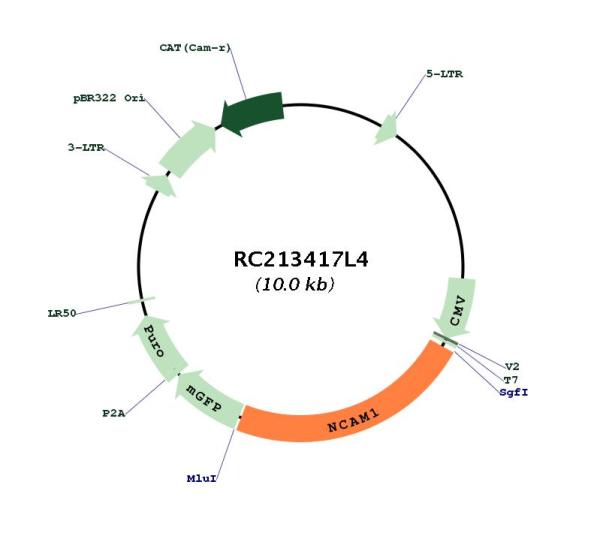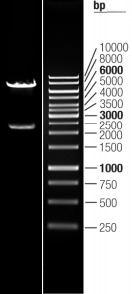CD56 (NCAM1) (NM_001076682) Human Tagged Lenti ORF Clone
CAT#: RC213417L4
- LentiORF®
Lenti-ORF clone of NCAM1 (mGFP-tagged)-Human neural cell adhesion molecule 1 (NCAM1), transcript variant 3
"NM_001076682" in other vectors (4)
Need custom modification / cloning service?
Get a free quote
CNY 8,528.00
CNY 9,980.00
CNY 1,999.00
CNY 2,700.00
Specifications
| Product Data | |
| Type | Human Tagged ORF Clone |
| Tag | mGFP |
| Synonyms | CD56; MSK39; NCAM |
| Vector | pLenti-C-mGFP-P2A-Puro |
| E. coli Selection | Chloramphenicol (34 ug/mL) |
| Mammalian Cell Selection | Puromycin |
| Sequence Data |
The ORF insert of this clone is exactly the same as(RC213417).
|
| Restriction Sites |
SgfI-MluI
Cloning Scheme for this gene
Plasmid Map

|
| ACCN | NM_001076682 |
| ORF Size | 2283 bp |
| OTI Disclaimer | The molecular sequence of this clone aligns with the gene accession number as a point of reference only. However, individual transcript sequences of the same gene can differ through naturally occurring variations (e.g. polymorphisms), each with its own valid existence. This clone is substantially in agreement with the reference, but a complete review of all prevailing variants is recommended prior to use. More info |
| OTI Annotation | This clone was engineered to express the complete ORF with an expression tag. Expression varies depending on the nature of the gene. |
| Product Components | The ORF clone is ion-exchange column purified and shipped in a 2D barcoded Matrix tube containing 10ug of transfection-ready, dried plasmid DNA (reconstitute with 100 ul of water). |
| Reconstitution | 1. Centrifuge at 5,000xg for 5min. 2. Carefully open the tube and add 100ul of sterile water to dissolve the DNA. 3. Close the tube and incubate for 10 minutes at room temperature. 4. Briefly vortex the tube and then do a quick spin (less than 5000xg) to concentrate the liquid at the bottom. 5. Store the suspended plasmid at -20°C. The DNA is stable for at least one year from date of shipping when stored at -20°C. |
| Reference Data | |
| RefSeq | NM_001076682.3 |
| RefSeq Size | 4944 bp |
| RefSeq ORF | 2286 bp |
| Locus ID | 4684 |
| UniProt ID | P13591 |
| Protein Families | Druggable Genome, ES Cell Differentiation/IPS, Transmembrane |
| Protein Pathways | Cell adhesion molecules (CAMs), Prion diseases |
| MW | 83.8 kDa |
| Gene Summary | This gene encodes a cell adhesion protein which is a member of the immunoglobulin superfamily. The encoded protein is involved in cell-to-cell interactions as well as cell-matrix interactions during development and differentiation. The encoded protein plays a role in the development of the nervous system by regulating neurogenesis, neurite outgrowth, and cell migration. This protein is also involved in the expansion of T lymphocytes, B lymphocytes and natural killer (NK) cells which play an important role in immune surveillance. This protein plays a role in signal transduction by interacting with fibroblast growth factor receptors, N-cadherin and other components of the extracellular matrix and by triggering signalling cascades involving FYN-focal adhesion kinase (FAK), mitogen-activated protein kinase (MAPK), and phosphatidylinositol 3-kinase (PI3K). One prominent isoform of this gene, cell surface molecule CD56, plays a role in several myeloproliferative disorders such as acute myeloid leukemia and differential expression of this gene is associated with differential disease progression. For example, increased expression of CD56 is correlated with lower survival in acute myeloid leukemia patients whereas increased severity of COVID-19 is correlated with decreased abundance of CD56-expressing NK cells in peripheral blood. Alternative splicing results in multiple transcript variants encoding distinct protein isoforms. [provided by RefSeq, Aug 2020] |
Documents
| Product Manuals |
| FAQs |
| SDS |
Resources
Other Versions
| SKU | Description | Size | Price |
|---|---|---|---|
| RC213417 | NCAM1 (Myc-DDK-tagged)-Human neural cell adhesion molecule 1 (NCAM1), transcript variant 3 |
CNY 6,128.00 |
|
| RC213417L3 | Lenti-ORF clone of NCAM1 (Myc-DDK-tagged)-Human neural cell adhesion molecule 1 (NCAM1), transcript variant 3 |
CNY 9,980.00 |
|
| RG213417 | NCAM1 (tGFP-tagged) - Human neural cell adhesion molecule 1 (NCAM1), transcript variant 3 |
CNY 8,930.00 |
|
| SC315450 | NCAM1 (untagged)-Human neural cell adhesion molecule 1 (NCAM1), transcript variant 3 |
CNY 6,136.00 |


 United States
United States
 Germany
Germany
 Japan
Japan
 United Kingdom
United Kingdom
 China
China


